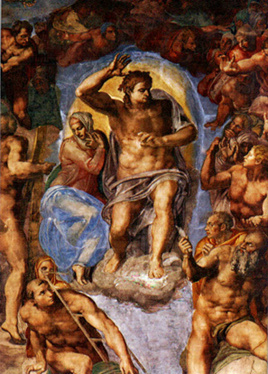59:1-19
Psalm 13
Hebrews 5:12-6:121
Mark 10:46-52
 There are times when the preacher looks at the lectionary readings and prefers to preach on the gospel text, but knows that would be a cop-out. This is one of those mornings. There’s a reason we have a lectionary, and it is important to preach on the readings we are given. So here goes.
There are times when the preacher looks at the lectionary readings and prefers to preach on the gospel text, but knows that would be a cop-out. This is one of those mornings. There’s a reason we have a lectionary, and it is important to preach on the readings we are given. So here goes.
I am going to suggest that there is a common theme in the lectionary readings this morning. They all deal with God’s judgment in a way that makes us uncomfortable. The uncomfortable part is that they deal with judgment in the lives of believers. This does not fit into the standard Christian narrative of creation, fall, redemption. In the standard narrative, God’s judgment applies to sinners. In the atonement, Christ takes on God’s judgment, and sinners are forgiven. Those who repent and place their faith in Christ no longer stand under God’s judgment. As Paul writes in Romans, “There is therefore no condemnation for those who are in Christ Jesus.” (Rom. 8:1)
Yet a common theme of the readings this morning is that even after redemption, judgment continues, and it is a divine judgment toward believers, of whom we should be able to say “there is no condemnation.” Despite divine grace, despite divine forgiveness, despite no condemnation, Scripture seems to speak at times as if there is judgment after all. What do the passages say?
In the Old Testament reading from Isaiah, the prophet speaks of a judgment on account of ongoing sin. “Behold, the Lord’s hand is not shortened that it cannot save, or his ear dull, that it cannot hear, but your iniquities have made a separation between you and your God.” (Isaiah 59:1-2) This is not a message of judgment against the nations, against those who have worshiped other gods. This is a message of judgment against those who call the Lord, the God of Israel, their God. The prophet puts himself in the place of Israel, of those who know that they stand under divine judgment: “Justice is far from us, and righteousness does not overtake us, we hope for light, and behold darkness, and for brightness, but we walk in gloom.” (59:9-10). He speaks for those who are conscious of their sin: “We hope for justice, but there is none, for salvation, but it is far from us. For our transgressions are multiplied before you, and our sins testify against us; for our transgression are with us, and we know our iniquities.” (59:12-13). (more…)




